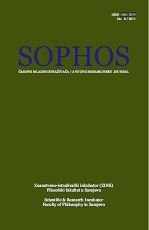Indirektna percepcija i situirana kognicija
INDIRECT PERCEPTION AND SITUATED COGNITION
Author(s): Mustafa ŠuvalijaSubject(s): Cognitive Psychology, Neuropsychology
Published by: Filozofski fakultet u Sarajevu - Znanstveno-istraživački inkubator
Keywords: indirect perception; situated cognition; representation; representative situationism;
Summary/Abstract: Since the theory of situated cognition is mostly positioned as a critique of the standard cognitive model, the critiques of the situationist thesis mostly deal with issues of contention between situationism and the standard model. A critical review of situationism can be expanded if attention is drawn to issues that are normally not the subject of these discussion, such as the issue of the nature of perception. Reinterpretation of the situatedness thesis in the light of the theory of indirect perception provides important insights that can form the basis for the modification of the basic tenets of situationism. The most important of these conclusions is that the indirect nature of perception, the fact that the observer is never directly aware of the observed object but only of the sense-data related to that object, undermines the possibility of situating the cognition in the external situation. Other than providing specific guidelines for the redefinition of situationism, these insights underline the importance of analyzing the role of perception in future research on situated cognition.
Journal: Sophos- časopis mladih istraživača
- Issue Year: 2015
- Issue No: 08
- Page Range: 81-98
- Page Count: 18
- Language: Bosnian

